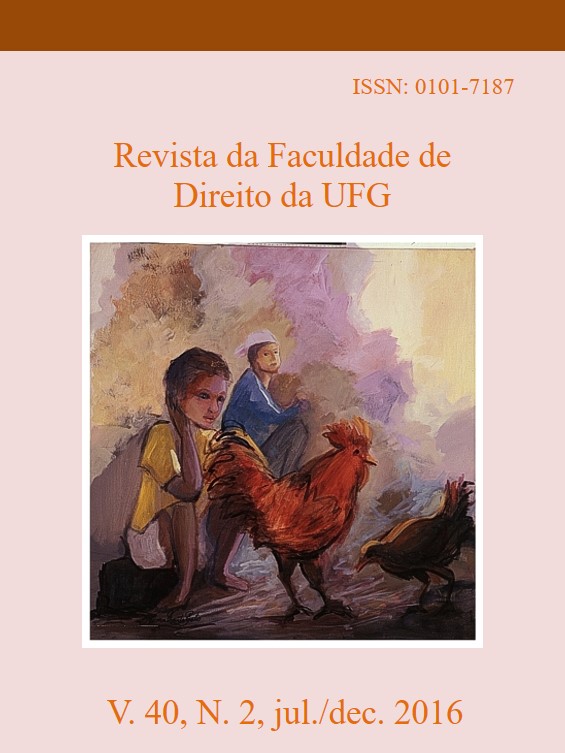MULTICULTURALISMO E (NOVOS) DIREITOS ENTRE DEMOCRACIA E CONSTITUCIONALISMO LATINO-AMERICANO - DOI: http://dx.doi.org/10.5216/rfd%20ufg.v40i2.42887
DOI:
https://doi.org/10.5216/rfd.v40i2.42887Palavras-chave:
multiculturalismo, educação, direitos humanos, democracia, constitucionalismo latino-americanoResumo
Resumo: As diversas dimensões que caracterizam o emergente Constitucionalismo do século XXI – política, social, econômica, ambiental e cultural – transformam em desafio as ações do Estado, que implicam os processos decisórios coletivos da sociedade contemporânea. É nesse ambiente que o presente artigo tem por objetivo levantar e discutir apontamentos interdisciplinares ao estudo da Democracia e do Constitucionalismo Latino-americano, prestigiando o pensamento crítico sobre e necessária relação entre multiculturalismo e os (novos) direitos como a educação em Direitos Humanos. Para que isso seja possível, são trabalhadas, inicialmente, as noções de multiculturalismo e tensões no Estado Constitucional. É diante de sociedades plurais que são (re)tencionadas as representaões políticas das Instituições Democráticas, exigindo-se, naturalmente, um espaço contramajoritário como exercício de soberania popular. Como resposta a estas condições, é proposto o estudo qualitativo sobre inclusão social e educação em Direitos Humanos como mecanismos viáveis de atuação de um Estado Democrático de Direito. Em outras palavras, é justamente diante do ambiente latino-americano que se pode compreender os (novos) direitos como mecanismos de enfrentamento de tensões entre democracia e constitucionalismo emergente. E mais: é preciso saber como canalizar as instituições para a promoção de mecanismos de inclusão social e construção da cidadania. Sequencialmente ao referido raciocínio, são apontados, criticamente, alguns desafios deste século, para uma educação plural e cidadã como exemplo de (novos) direitos, entre os quais se destaca a educação em Direitos Humanos. Esta análise crítica justifica-se pela necessidade do avanço do conhecimento científico no ambiente de estudo metodológico como forma de tutela estatal diante do multiculturalismo latino-americano.
Abstract: The various dimensions that characterize the emerging Constitutionalism twenty-first century - political, social, economic, environmental and cultural - turn to challenge the State's actions, involving the collective decision-making processes of contemporary society. It is in this environment that this article aims to raise and discuss interdisciplinary notes the study of Democracy and Constitutionalism Latin American and prestige critical thinking about and necessary relationship between multiculturalism and the (new) rights such as education in human rights. For this to be possible, they are worked initially, the multiculturalism of notions and tensions in the Constitutional State. It is in front of plural societies that are (re) tensioned political representations of Democratic Institutions, demanding, of course, a contramajoritário space as popular sovereignty exercise. In response to these conditions, the qualitative study on social inclusion and education in human rights as viable mechanisms of action of a democratic state is proposed. In other words, it is just before the Latin American environment that one can understand the (new) rights as stress coping mechanisms among emerging democracy and constitutionalism. Plus, you need to know how to channel the institutions to promote mechanisms for social inclusion and empowerment. Sequentially to that reasoning, are singled out, critically, some challenges of this century, for a plural and citizenship education as an example of (new) rights, among which stands out education in human rights. This critical analysis is justified by the need for the advancement of scientific knowledge in the methodological study environment as a form of state supervision on the Latin American multiculturalism.
Downloads
Downloads
Publicado
Como Citar
Edição
Seção
Licença
Os Autores que publicam nesta revista concedem à Revista da Faculdade de Direito da UFG uma licença mundial, sem royalties, sujeita aos termos e condições da Licença Jurídica Creative Commons Atribuição 3.0 Brasil Creative Commons Attribution License
Os autores concedem à RFD UFG todos os direitos autorais sobre os artigos nela publicados, que os mantêm com exclusividade até o advento de domínio público sobre os mesmos.
























